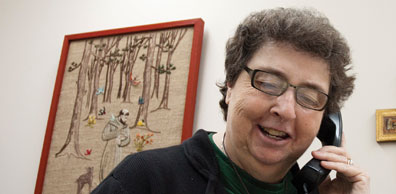
 Each day, religious sisters in South Carolina perform a myriad of tasks. Some teach children about reading, writing and God’s love. Others help the poor with food and clothing, work with the sick and their caregivers, help keep parishes running, or spend their time in prayer.
Each day, religious sisters in South Carolina perform a myriad of tasks. Some teach children about reading, writing and God’s love. Others help the poor with food and clothing, work with the sick and their caregivers, help keep parishes running, or spend their time in prayer.
Whatever they do, sisters in the Diocese of Charleston are filling important roles in the church and in society. They know these are challenging times for many religious communities, with numbers dwindling and membership aging as needs for their services grow. Those who spoke with The Miscellany recently, however, radiated a quiet confidence in their work and their role spreading the Gospel message.
In the classroom
Franciscan Sister Mary Schifferle teaches religion at St. Anthony of Padua School in Greenville. Her students range from K-3 to sixth grade. Some come from poor households, and many aren’t Catholic. Her lessons range from Bible stories and church manners for younger children to the sacraments and Catholic history for older students.
“I feel like I’m feeding hungry children who want to know more about God,” she said. “It’s a great joy for me to be able to share the good news of God’s love and how important they are to Him and to the world.”
Prayer and reflection
Adrian Dominican Sister Sharon Culhane spent most of her life teaching and working with the poor.
She came to South Carolina in 1975 and served everywhere from McClellanville to Daufuskie Island. Now, she helps people find God in a busy world as a retreat leader at Sea of Peace House of Prayer on Edisto Island. The house offers individuals or small groups a place to pray, rest, and study Scripture in a quiet coastal setting.
Sister Sharon has met people of all ages and faiths who sought out the house in order to become closer to God and learn more about prayer, perhaps in a walk around Sea of Peace’s shaded prayer labyrinth.
“The best thing is meeting these wonderful people who are searching to deepen their prayer life,” she said. “This environment lends itself to it, to people learning how to slow down. Because I’ve had an active life, I’ve been learning how to slow down as well. You have to practice what you preach.”
Serving the poor
Franciscan Sisters Sheila M. Byrne and Stella Breen have helped thousands in Beaufort County and other parts of the Lowcountry from the Franciscan Center on St. Helena Island, which they started in 1987.
They and a staff of dedicated volunteers tutor students, organize English as a Second Language and literacy classes for adults, stock a food pantry, help with utility bills and home repair, and gather supplies for migrant workers.
Sister Stella also helps immigrants, mainly Hispanic, navigate the immigration system.
“We wanted to be present to the people, to listen to them be conscious and learn what it is they feel they need,” Sister Sheila said. “Everything we’ve done has flowed from our listening and praying. Our work has just grown as the years went by.”
Parish work
For 25 years, Sister Carol Gnau has done whatever needs doing as pastoral associate at Summerville’s St. John the Beloved Church. That work includes teaching the Rite of Christian Initiation for adults, leading Scripture study, helping people with annulments, serving in prison ministry, and organizing community outreach and ecumenical activities, among other tasks.
Sister Carol, a School Sister of Notre Dame, spent 22 years as a teacher and principal before beginning parish work.
“It’s a very multifaceted ministry and sometimes you can’t keep up with all that needs to be done, but I do enjoy the variety,” she said. “I try to be someone that encourages folks to share their talents and helps people to learn about their faith.”
Healthcare
Sister Nancy Hendershot of the Sisters of Charity of St. Augustine has worked in the health care field for most of her religious life.
When she was vice-president for ministry and mission at Providence Hospitals in Columbia, she worked with staff members to make sure they understood that church values need to be the root of every action, from accounting to patient care.
As the number of religious sisters working in health care declines, Sister Nancy said the new focus will likely be helping others carry on with the sisters’ work.
Her order is increasingly collaborating with men and women who want to become associates, and others interested in Catholic health care.
“We’re at that point where a lot of us are helping others to pass on the mission,” she said. “We’re forming the ones who will form the next generation in ministry. There are fewer religious these days, but there are people who have their own vocations to carry on our mission among the laity.”
